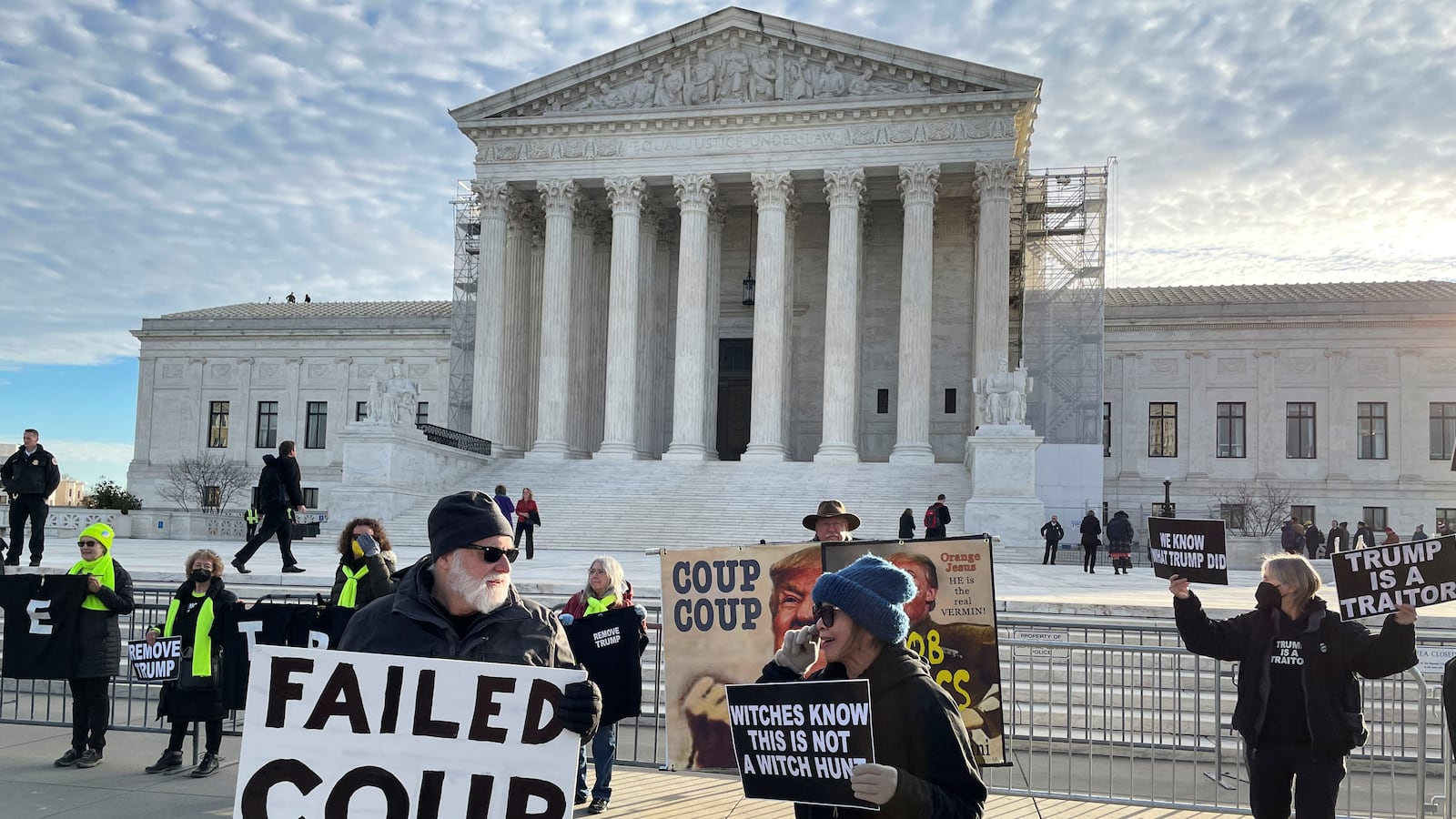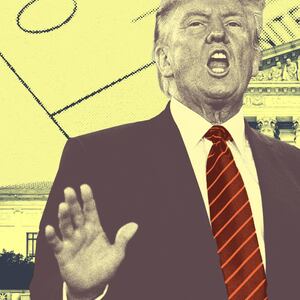State officials cannot prohibit Donald Trump—or anyone else—from running for the White House “even if the candidate is an admitted insurrectionist,” the former president’s lawyers told the Supreme Court on Thursday.
The nation’s highest court is now considering whether Colorado and several other states can yank Trump from the 2024 ballot, employing the 14th Amendment to deem his plot to remain in office after losing the 2020 election as an “insurrection” as defined by the Constitution.
And yet the Supreme Court seems poised to reject the effort entirely, with justices expressing concerns about exploding a partisan powder keg that would have state officials everywhere engage in bad faith to block merely undesirable candidates from office. They were also skeptical that the law keeping insurrectionists out of government even applies to the one role most critical to the country’s fate: the presidency.
The central issue in this historic case is that Trump has not been charged—or even convicted—of insurrection, even though several federal judges, the Justice Department, and congressional investigators have essentially deemed the Jan. 6, 2021, attack on Congress as a violent rebellion that threatened the nation’s democracy.
Trump’s lawyer, Jonathan Mitchell, warned that allowing state officials to unilaterally knock the former president from the ballot would “take away the votes of potentially tens of millions of Americans.” He argued that having states utilize the 14th Amendment as a tool this way “would be adding to and altering” the Constitution’s qualifications for the presidency.
Much of the court appeared moved by those points. Chief Justice John Roberts warned that allowing Colorado to bar Trump could open the door for other states to keep all kinds of people off the presidential ballot in future elections. Justice Samuel Alito asked how this event wouldn’t usher in an “unmanageable situation” nationwide.
The law in question is Section 3 of the 14th Amendment, which was adopted after the Civil War as a measure that would bar from office those pro-Confederate insurrectionists who had taken an oath to support the Constitution.
The case forces the Supreme Court to closely examine that provision, which says, “No person shall be a senator or representative in Congress, or elector of president and vice president, or hold any office, civil or military, under the United States, or under any state, who, having previously taken an oath, as a member of Congress, or as an officer of the United States, or as a member of any state legislature, or as an executive or judicial officer of any state, to support the Constitution of the United States, shall have engaged in insurrection or rebellion against the same, or given aid or comfort to the enemies thereof.”
Importantly, the Constitution makes no mention of conviction. But justices know that allowing a state to take such a dramatic step could be perceived as unfair by some in the American public—even those outside Trump’s MAGA movement.
Justice Ketanji Brown Jackson explored why the provision doesn’t explicitly mention the president as being covered by this rule, noting that it starts by listing senators, congressional representatives, and electors—only to later include officers of the United States. She questioned whether it was plausible that “the framers would have smuggled it in with that catch-all phrase.”
Several other justices questioned the use of the term “officer,” showing how some of this case might hinge on whether or not a president can be deemed a federal officer, even if that would mean, paradoxically, that the Constitution keeps all insurrections out of office—except the commander in chief.
Mitchell drew from another part of the Constitution, Article II, Section 3, noting that, “The president shall commission all of the officers of the United States. The president doesn’t commission himself and he cannot commission himself.”
“If ‘officer of the United States' means appointed officials, there’s just no way he’s covered by Section 3,” he said.
The opposing lawyer, who represents the effort to keep Trump off the ballot in Colorado, dismissed this line of reasoning as too focused on language as opposed to the bigger picture.

Former U.S. President and Republican presidential candidate Donald Trump holds a campaign rally.
Reuters“This case does not come down to mere prepositions,” said Jason Murray, who represents the Colorado woman who set this effort into motion.
Norma Anderson, a 91-year-old former Republican legislator from Colorado who has rejected MAGA politics, is the plaintiff in the case.
“States are allowed to safeguard their ballots by excluding those who are… as here, those who have engaged in insurrection against the Constitution in violation of their oath,” Murray told the justices.
Justice Clarence Thomas prodded Murray to provide “contemporaneous examples” that would show that states disqualified national candidates shortly after the 14th Amendment was adopted in 1868. Murray pointed to the way Georgia’s governor disqualified a congressman that same year, but he also argued that state officials back then couldn’t yank someone from the ballot the way states want to do with Trump now because the voting system was different.
“Not surprising there are few examples, because they didn't have ballots. They were party ballots or write-in. There wouldn't be a process to determine before an election if a candidate was qualified,” Murray said.
Justice Neil Gorsuch seized on Murray’s theory that Trump became disqualified for insurrection “from the moment it happened,” questioning whether that would suddenly allow military officers to independently decide they could simply reject a president’s orders. To that, Murray assured that a political impeachment was the right tool while a person was in office—stressing the need to use a tool like this now before someone like Trump returns to the White House.
It took nearly an hour for the court to address the heart of the matter: whether Trump’s role in whipping up the crowd of his raging supporters in Washington, D.C. three years ago counted as inciting an insurrection—or if the violent attack could be deemed as such.
“We never accepted that this was an insurrection… President Trump did not engage in any act that can be plausibly categorized in insurrection,” Mitchell told the court, claiming that the term “insurrection” is narrowly defined.
“There needs to be an organized, concerted effort to overthrow the government of the United States through violence,” he said.
“A chaotic effort to overthrow the government is not an insurrection?” Justice Ketanji Brown Jackson shot back.
That prompted Mitchell to acknowledge that “the events were shameful, criminal, violent.”
Thursday’s hearing also served to highlight the Justice Department’s reluctance to criminally indict Trump for sedition. Justice Brett Kavanaugh questioned the use of the 14th Amendment against Trump by noting that the country already has protections in place to keep insurrectionists from commanding the entire U.S. government.
“There is a tool to ensure that does not happen, namely federal prosecution of insurrectionists. And if convicted, Congress made clear, you are automatically barred from holding federal office,” Kavanaugh said. “But President Trump has not been charged with that.”
Murray countered by stressing the historical context behind the 14th Amendment, noting that it provided a secondary means of keeping southern rebels out of office at a time when so many of them avoided prosecutions by receiving pardons from criminal charges.
The decision is already tainted by the fact that Justice Clarence Thomas decided to remain on the panel hearing the arguments—despite the fact that his wife played a central role in the very insurrection in question. Emails obtained by the House Jan. 6 Committee that initially investigated what led up to the violent assault on the U.S. Capitol showed that conservative activist Ginni Thomas had coordinated with John Eastman, a Trump lawyer who came up with the plan to interrupt the certification of the 2020 election. And she had even emailed Arizona state lawmakers, pushing them to engage in Trump’s plan to replace legitimate electors with MAGA loyal pawns who sought to flip the election results.
On Wednesday, a day before the Supreme Court would hear the case, Sen. Dick Durbin (D-IL) tweeted, “I’m calling for Justice Clarence Thomas to recuse himself in the 14th Amendment case determining if Donald Trump is ineligible for the 2024 ballot.”
On Thursday, the progressive group Stand Up America stressed that Thomas’ decision to remain on the panel posed a serious threat to a fair outcome.
“Justice Thomas should recuse himself from this monumental case. Ginni Thomas’ involvement in the seditious conspiracy that led to the January 6 insurrection is a bald-faced conflict of interest. If Thomas refuses, it will not only be a blatant denial of impartial review but also a rejection of Chief Justice Roberts’ recently issued Code of Conduct,” it said in a statement.
And yet Justice Thomas, who rarely speaks up, was the first to make a question, asking what role the states would play.
The irony of this unprecedented court case was captured by an exchange initiated by one of Trump’s own appointees.
“What about the idea that we should think about democracy, the right of the people to elect candidates of their choice, of letting the people decide? Your position has the effect of disenfranchising voters to a significant degree,” Kavanaugh said.
“This case illustrates the danger… the reason we’re here is that Trump tried to disenfranchise 80 million Americans,” Murray responded.







